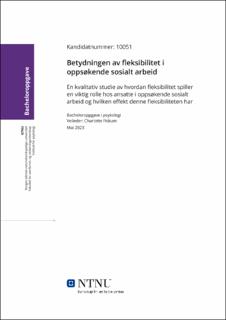| dc.contributor.advisor | Fiskum, Charlotte | |
| dc.contributor.author | Tanem, Tuva Skei | |
| dc.date.accessioned | 2023-07-04T17:19:40Z | |
| dc.date.available | 2023-07-04T17:19:40Z | |
| dc.date.issued | 2023 | |
| dc.identifier | no.ntnu:inspera:146342237:70204877 | |
| dc.identifier.uri | https://hdl.handle.net/11250/3075771 | |
| dc.description.abstract | Bakgrunn: oppsøkende sosialt arbeid omfatter arbeid med unge i risiko som ofte befinner seg i marginaliserte grupper og står i fare for å bli revet løs fra det sosiale fellesskapet. De ansatte i de oppsøkende tjenestene har omfattende arbeidsoppgaver og arbeidsforholdene er ikke alltid ideelle. For å forstå hva som fungerer og hva som kan oppleves som utfordrerne for de ansatte, ble dette sett i lys av fleksibilitet: «Hvilken betydning har fleksibilitet i oppsøkende sosialt arbeid med barn og unge i risiko?». Formålet med oppgaven er å utforske og få en bredere forståelse for betydningen av fleksibilitet i det oppsøkende sosiale arbeidet. Metode: oppgaven er kvalitativ og benytter en tematisk analyse. Utvalget består av 11 informanter og data ble samlet inn gjennom semistrukturerte intervju både fysisk og digitalt. Intervjuene er tatt opp ved hjelp av lydopptak og transkribert for å gjøres tilgjengelig for analyse. Resultat: fra den tematiske analysen ble det trukket ut 3 hovedtemaer; behov for fleksibilitet, rapportering av resultater og ressursmangel. Resultatene ble sett i lys av Toleransevindumodellen og New Public Management (NPM), og annen relevant tidligere forskning. Det ble funnet at spesielt underveisvurderinger og aktiviteter gir behov for fleksibilitet i arbeidet. Målbare tall, dokumentasjon og NPM, i tillegg til tilgang til ressurser, illustrerer hva som inngår i rapportering av resultater og hvorfor dette er nødvendig men vanskelig i praksis. Videre ble menneskelig og økonomiske ressurser, i tillegg til tid spesielt trukket ut som eksempler på ressurser som mangler i det oppsøkende arbeidet. | |
| dc.description.abstract | Background: outreach social work refers to work with children and youth at risk who are often located in marginalized groups and are in danger of being torn away from the social community. The employees have extensive tasks within their profession and the job conditions are not always ideal. In order to understand what is ideal, and what can be challenging, this can be explored in terms of flexibility, more specifically: "What is the significance of flexibility in outreach social work with children and youth at risk?". The purpose of the thesis is to explore and gain a broader understanding of the importance of flexibility in outreach social work. Method: the thesis is qualitative and uses a thematic analysis. The sample consists of 11 workers, and data was collected through semi-structured interviews both in-person and digitally. The interviews were recorded using audio and transcribed to make them available for analysis. Result: from the thematic analysis, 3 themes were extracted; need for flexibility, reporting of results and lack of resources. The results were viewed in terms of the tolerancewindowmodel and New Public Management (NPM), as well as relevant research. Findings portray that mid-term assessments and activities create a need for flexibility in the work. Measurable results, documentation and NPM, in addition to access to resources, illustrate what is included in reporting results and why this is necessary, but difficult in practice. Furthermore, human and financial resources, and time, were emphasized as examples of resources that are lacking in the this work. | |
| dc.language | nob | |
| dc.publisher | NTNU | |
| dc.title | Betydningen av fleksibilitet i oppsøkende sosialt arbeid. En kvalitativ studie av hvordan fleksibilitet spiller en viktig rolle hos ansatte i oppsøkende sosialt arbeid og hvilken effekt denne fleksibiliteten har. | |
| dc.type | Bachelor thesis | |
